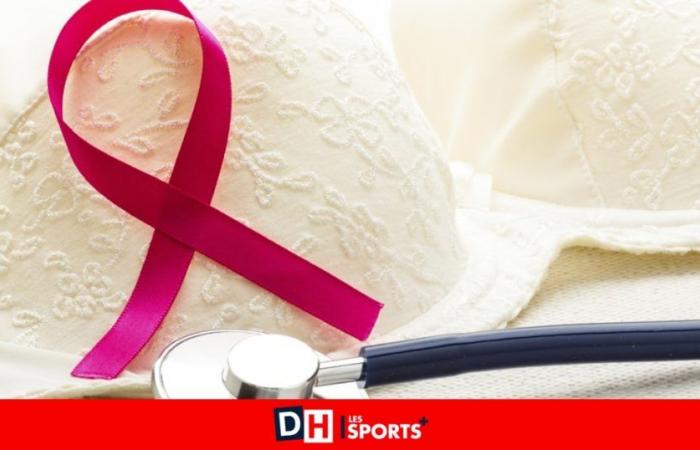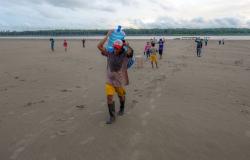
And on average, 2,000 women still lose their lives each year from breast cancer in Belgium, many of them still in the prime of their lives.
Pink October: support the fight against breast cancer
Faced with this situation, Partenamut decided to meet them, in Liège and Brussels, to raise their awareness of the importance of screening as part of its campaign called “I could have it, I had it.” This initiative aims to inform as many people as possible about the importance of screening and self-examination, essential in the early detection of breast cancer. In partnership with the non-profit organization Oncobulle, Partenamut is also committed to post-cancer guidance by expanding its support services for people affected by the disease. Flagship actions can be found in the Brussels region on October 12 and 19 and in Liège on October 11 and 25.
This is therefore the opportunity to discuss with Gladys Villey, Director of the Personal Assistance Department at Partenamut, the accessibility of this screening but also all the services offered to women suffering from cancer or in remission.
guillementThere is still a lot of work to do to make prevention a real priority.”
The Brussels resident returns this Sunday to the Fallon stadium, to support research against breast cancer
What is your view on the figures linked to early detection in Belgium, particularly in Wallonia and Brussels? “The figures show that, on the French-speaking side of Belgium, there is still a lot of work to be done to make prevention a real priority. Although the subject is often raised, we have not yet found the lever for action effective to make it a reflex in women There is still much to be accomplished However, we know that the earlier the cancer is detected, the higher the chances of cure and the more effective the treatments are. a significant margin of progress in terms of early detection.”
What role does mutual insurance play in raising awareness of breast cancer screening? “Our objective is to open the dialogue on crucial health subjects, such as breast cancer, but also other slightly more taboo themes, such as colorectal cancer. For breast cancer, we wish to be pragmatic and accessible in terms of prevention We highlight the right actions, such as self-examination, a simple gesture that allows you to detect a tumor at an early stage. Our awareness workshops and our experts in the field offer concrete advice and guidance. clear information, with the aim of reaching as many people as possible.
“Saying that breast cancer kills is becoming taboo”: This essential parameter in the daily life of patients remains too often neglected
What do you actually propose? “For example, we regularly organize campaigns in Brussels and Liège, including self-examination awareness workshops, in partnership with various health stakeholders. These events are a real success, because many women do not always know how to carry out this examination themselves, or when to consult a doctor. We also work with associations like OncoBulle, which offers holistic support for patients, including post-treatment care such as physiotherapy, breast tattooing, and even dietetics.”
What types of campaigns or initiatives have you put in place to encourage screening among your policyholders? “We have launched awareness initiatives in collaboration with local partners to make information more accessible. This includes awareness events, free consultations for self-examination, and concrete actions on the ground, particularly in rural areas and working-class neighborhoods. We want not only to inform, but also to support women in taking action.”
Does the mutual fund fully or partially cover the costs related to breast cancer screening (mammograms, additional examinations)? “The mutual covers the costs related to breast cancer screening, whether for mammograms or additional examinations. We work in partnership with hospital structures to guarantee smooth reimbursement and facilitate access to these essential services. “
A “form of bone cancer”: Boris Johnson makes revelations about the health of Queen Elizabeth
How does the mutual support women diagnosed following screening? What types of support or help are offered? “Our role, as a mutual insurance company, is above all to ensure smooth and efficient reimbursement, but we have also put in place holistic support. We are interested in the journey of women diagnosed, trying to respond to the needs that arise during -beyond medical care This includes psychological support, social support for administrative procedures, as well as a network of professionals to alleviate the mental burden.”
It must be said that care continues even after remission. “We have also noticed that a critical moment occurs after remission, when patients return home and face the psychological and physical impact of the treatments. They may feel alone, unprepared to face these new challenges. This is where the mutual can make the difference by directing them to the right care providers and offering them ongoing support.”
Have you noticed any specific barriers women face in accessing screening, such as financial, geographic or cultural barriers? “Yes, of course. We have observed that some women postpone their screening, often due to lack of information or because they are overwhelmed by their responsibilities. This is particularly the case for women who take care of both their children and their parents, or those living in precarious conditions Screening can then be relegated to the background, even if financial barriers, thanks to reimbursements, are less frequent. diagnosis, which plays a role.“
Breast cancer: the Pink October campaign begins
What actions does the mutual fund propose to improve access to breast cancer screening, particularly for women in precarious situations or living in rural areas? “We have noted that women in precarious situations face additional vulnerability. Often, they are consumed by everyday challenges, such as housing or managing children, and screening comes second. We try to make screening more accessible through local awareness campaigns, by partnering with community associations. We are also setting up points of contact in rural and working-class areas, to encourage these women to take care of themselves without guilt.”
What is the feedback from policyholders regarding the screening programs supported by the mutual? “The feedback is very positive. Many women tell us that they did not know how to do a self-examination, or that they had never taken the time to be screened before being informed by our campaigns. We see that These initiatives make a real difference.”
As a person responsible for personal assistance, what are your long-term objectives in terms of breast cancer prevention and screening for policyholders? “Our goal is to increase the number of women who take action. We want to see a 20% increase in screenings this year. We also want to “de-taboo” these health topics, by showing that there is no there are no embarrassing or shameful questions to ask. It is by speaking freely and informing that we can encourage more women to get tested.”





